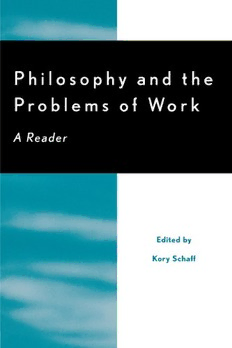Table Of ContentPhilosophy and the
Problems of Work
Philosophy and the
Probletns of Work
A Reader
Edited by
Kory Schaff
ROWMAN & LITTLEFIELD PUBLISHERS, INC.
Lanham • Boulder • New York • Oxford
ROWMAN & LITfLEFIELD PUBLISHERS, INC.
Published in the United States of America
by Rowman & Littlefield Publishers, Inc.
4720 Boston Way, Lanham, Maryland 20706
www.rowmanlittlefield.com
12 Hid's Copse Road
Cumnor Hill, Oxford OX2 9]], England
Copyright © 2001 by Rowman & Littlefield Publishers, Inc.
All rights reserved. No part of this publication may be reproduced,
stored in a retrieval system, or transmitted in any form or by any
means, electronic, mechanical, photocopying, recording, or otherwise,
without the prior permission of the publisher.
British Library Cataloguing in Publication Information Available
Ubrary of Congress Cataloging-in-Publication Data
Philosophy and the problems of work : a reader I edited by Kory Schaff.
p. ern.
Includes bibliographical references and index.
ISBN: 978-0-7425-0795-1
1. Work. I. Schaff, Kory, 1974-
BJ1498.P495 2001
174-dc21
00-054435
Printed in the United States of America
QTM
'C:7 The paper used in this publication meets the minimum requirements of
American National Standard for Information Sciences-Permanence of Paper
for Printed Library Materials, ANSI!NISO 239.48-1992.
To the memory of my sister and friend,
Krista Kay Schaff Brown
2 June 1970-3 July 1997
who understood the problems of work.
''Living in a constant chase after gain compels people
to expend their spirit to the point of exhaustion in continual pretence
and overreaching and anticipating others."
-Nietzsche, 1be Gay Science
Contents
Preface ix
Acknowledgments xiii
Introduction: Philosophy and the Problems of Work, by Kory Schaff 1
Part 1 Modern Society, Technology, and "Work" 19
1 Hannah Arendt, Tbe Human Condition 23
2 Herbert Marcuse, Eros and Civilization 43
3 Michel Foucault, Discipline and Punish 59
4 Mark Okrent, "Work, Play, and Technology" 73
5 Gregory Pence, "Towards a Theory of Work" 93
Part 2 Meaningful Work and Exploitation 107
6 Robert Nozick, Anarchy, State, and Utopia 109
7 David Schweickart, Against Capitalism 123
8 Allen Wood, "Exploitation" 141
9 Gary Dymski, "Racial Inequality and Capitalist Exploitation" 165
Part 3 Justice and Equality 175
10 John Rawls, A Tbeory ofj ustice 179
vii
viii Contents
11 Richard Arneson, "Is Work Special? Justice and the 201
Distribution of Employment"
12 G. A. Cohen, Self-Ownership, Freedom, and Equality 217
13 Ann Ferguson, "Sex and Work" 227
14 Gregory Kavka, "Disability and the Right to Work" 249
Part 4 The WeJfare State and Democratic Rights 26S
15 Mary Hawkesworth, "Workfare and the Imposition of 267
Discipline"
16 Jon Elster, "Is There (or Should There Be) a Right to Work?" 283
17 Phillipe van Parijs, "Basic Income Capitalism" 301
18 Andrew Levine, "Fairness to Idleness: Is There a Right 317
Not to Work?"
Part S After Capitalism? 337
19 John Roemer, "The Morality and Efficiency of Market 339
Socialism"
20 David Schweickart, "What's Labor Got to Do with It? 355
Capitalism and the Counterproject"
Index 381
About the Editor 384
Preface
This project has a long and protracted history. It first began to germinate
when I was an undergraduate, when I wrote a senior honors thesis on Marx's
theory of exploitation and its normative dimensions. After graduating, I took
one year off before going to graduate school, working at a job in which I had
little interest. The job provided a wage, but it had little potential to develop
my personal and professional talents. I began to think about the philosoph
ical significance of work from the "inside," so to speak. Even in the modern
developed world, work remains the central activity for individuals. It was un
fortunate, then, that so many of my coworkers thought little about the impli
cations of the life of work, instead simply assuming that work was something
one had to do. Getting people to reflect on the conditions of the possibility
in their daily lives is a hard task, made all that much harder by work condi
tions in which one is asked not to think critically for oneself and where the
institutional design of work forecloses asking certain questions about the rel
ative importance of work to, say, leisure or the development of personal tal
ents outside the workplace. In the world of work, no one understood my fas
cination with and philosophical interest in the subject of work: why we do it,
bow we go about it, and what it means that those things change.
Subsequently, I began to trace the historical discussions of work in
philosophy, beginning with Plato's Republic and working up to the great
nineteenth-century philosophers of work, Hegel and Marx. This project was
originally intended to capture the long-standing interest of philosophers on
the subject of work. By organizing the contemporary discussions of these
subjects, however, I hope to build upon this history and promote economic
philosophy as an important and crucially overlooked area of investigation, in
ix

